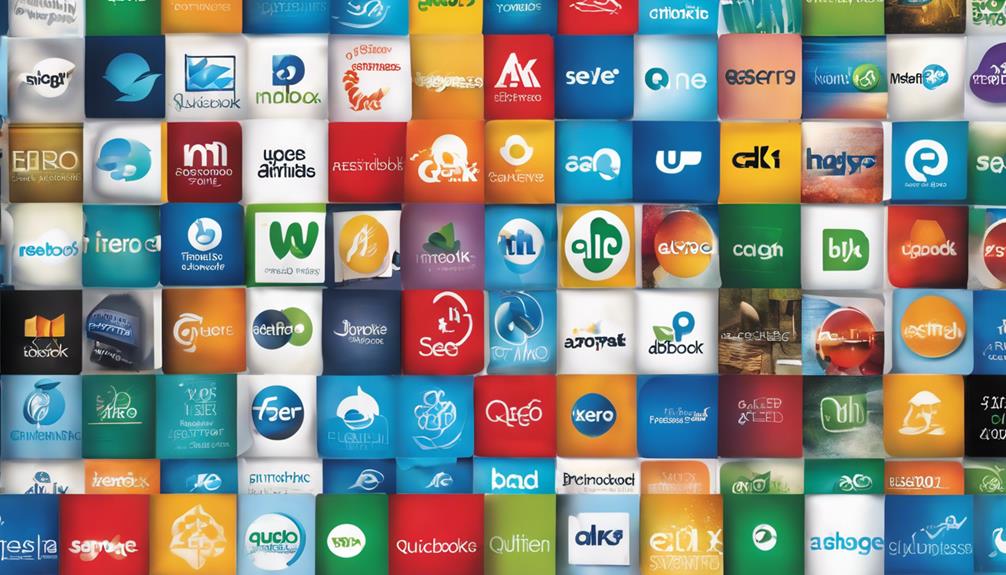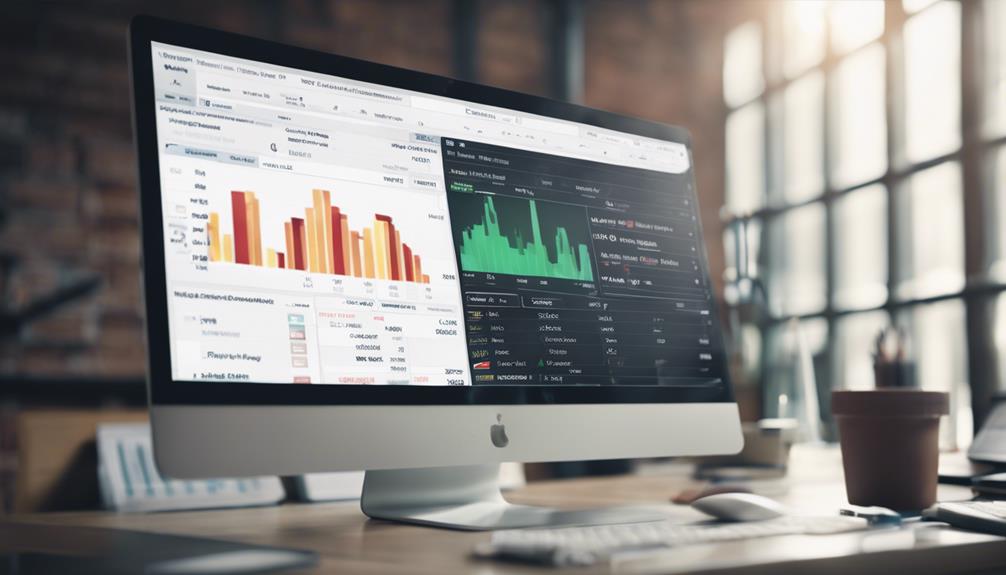Imagine a scenario where your business is struggling to keep up with manual bookkeeping processes, leading to errors and delays in financial reporting. The solution lies in selecting the right accounting software tailored to your specific needs.
By choosing the appropriate software, you can streamline your financial operations, enhance accuracy, and fuel growth. But why is this choice so critical for your business's success? Let's explore the pivotal reasons behind this decision.
Key Takeaways
- Save time and reduce errors with automation features.
- Ensure accurate financial reporting and tax compliance.
- Control costs by choosing software that fits your budget.
- Prioritize essential features like automated invoicing and customizable reporting.
Factors to Consider When Choosing Accounting Software
When selecting accounting software, it's crucial to carefully evaluate various factors to ensure the system meets your business's specific needs and requirements. As a small business owner, choosing the right software is vital for managing your financial tasks efficiently. Consider the features offered by different accounting software options, such as accounts receivable/payable, inventory tracking, and additional services like payroll processing. Think about whether cloud accounting is essential for your business or if desktop software would suffice. Scalability is another critical factor to keep in mind, ensuring that the software can grow with your business.
As you evaluate different accounting software options, think about the size of your business and the number of users who'll need access to the system. Additionally, weigh the cost considerations between basic software and more expensive options with advanced features. By carefully assessing these factors, you can choose accounting software that aligns with your business's needs and supports its financial management effectively.
Benefits of Using Accounting Software

When utilizing accounting software, you benefit from time-saving automation features that streamline tasks such as invoicing and payment processing. This software ensures precise financial reporting and aids in compliance with tax regulations, lowering the risk of human error through direct bank connections.
Time-Saving Automation Features
By utilizing the time-saving automation features of accounting software, businesses can streamline invoicing, reconcile bank transactions accurately, and automate inventory management for efficient operations.
- Automated Invoicing: Save time and ensure prompt payment processing.
- Accurate Bank Transactions: Reduce manual errors with automated reconciliation.
- Efficient Inventory Management: Automate tracking of goods and supplies for streamlined operations.
These features not only save time but also improve accuracy, allowing for better decision-making and enhancing overall business efficiency.
With customizable reporting options, cloud-based accessibility for remote work, and data backup capabilities, accounting software provides essential tools for modern businesses seeking to operate seamlessly and effectively.
Accurate Financial Reporting
Utilizing accounting software for accurate financial reporting streamlines calculations and eliminates manual errors, providing valuable insights for informed decision-making and effective business planning. Small business accounting benefits greatly from the detailed financial reports generated, aiding in tracking income, expenses, and cash flow effectively. This ensures improved financial management and compliance with tax regulations. Additionally, timely invoicing and payment processing are facilitated, enhancing overall efficiency. By leveraging accounting software, you can stay on top of your financial data, make informed decisions, and plan for the future with confidence.
| Benefits of Accounting Software |
|---|
| Streamlined calculations |
| Elimination of manual errors |
| Valuable insights for decision-making |
| Effective business planning |
| Improved financial management |
Streamlined Invoicing Process
Automating the invoicing process through basic accounting software enhances efficiency and accuracy in managing financial transactions for businesses. By streamlining your invoicing process, you can ensure timely payments from clients, ultimately improving your cash flow.
With accounting software, you have the ability to customize and brand your invoices to reflect your business's identity. Additionally, detailed invoicing reports generated by the software provide valuable insights into payment trends and outstanding balances.
Integration with payment gateways also allows for seamless online payment processing directly from the invoices, making it convenient for your clients to settle their dues promptly. Choose the right accounting software to optimize your invoicing process and ensure timely payments.
Cost Considerations for Accounting Software

When considering accounting software costs, prioritize finding cost-effective solutions that align with your budget.
Look for budget-friendly options that offer the necessary features without unnecessary expenses.
Cost-Effective Solutions
Selecting cost-effective accounting software involves carefully assessing the financial implications to ensure long-term savings for your business. When considering cost-effective solutions, keep in mind:
- Monthly Subscription Fees: Evaluate the range of fees, typically between $10 to $40, for cloud-based software.
- One-Time Charges vs. Subscription Models: Understand the differences in pricing structures to make an informed decision.
- Hidden Charges and Contract Flexibility: Consider potential additional fees, contract terms, and any hidden costs associated with the software.
Budget-Friendly Options
For those seeking budget-friendly options in accounting software, assessing the range of available features and pricing structures is essential for making a cost-effective decision. Accounting software costs can vary, with monthly subscriptions for cloud-based options typically ranging from $10 to $40. Some providers offer free or inexpensive options, while others have higher-tier plans with advanced features.
Understanding pricing models, like monthly subscriptions or one-time charges, is crucial for budget considerations. Evaluating the cost-effectiveness of accounting software can help prevent common mistakes and save time and money in the long run. Investing in higher-cost software may provide advanced features tailored to your business needs, ensuring efficient financial management.
Usability Factors in Accounting Software

To maximize the usability of accounting software, assess the number of users it can accommodate, ranging from solo entrepreneurs to large teams. When evaluating accounting software for your business, consider whether you need a cloud-based system for enhanced mobility and accessibility or a desktop software for specific operational requirements.
Additionally, check for mobile app availability as it's crucial for on-the-go access to financial data and tasks. Integration capabilities with other software systems or tools play a significant role in streamlining processes and improving overall efficiency.
Moreover, multi-user access is essential for enabling different team members to collaborate and work concurrently on financial tasks within the software.
Consider the number of users the software can support, catering to your business's size and growth. Evaluate whether a cloud-based or desktop system aligns better with your mobility and operational needs. Check for mobile app availability to ensure convenient access to financial information while on the go.
Top Accounting Software Providers

When considering the top accounting software providers, it's crucial to analyze their features and pricing plans meticulously to align with your business needs and budget effectively. QuickBooks offers a range of solutions starting at $12.50 per month, encompassing payroll, estimate creation, and receipt organization.
FreshBooks, with pricing from $6 per month, provides expense tracking and estimate submissions tailored for small businesses.
Sage 50cloud integrates with Microsoft 365, offers cash flow analysis, inventory management, and provides 24/7 support on annual plans.
Wave Accounting, a free software, links multiple bank accounts/credit cards and generates financial reports suitable for businesses of any size.
These top accounting software providers cater to diverse business needs, offering features like inventory management, financial reports, and support teams, all while considering various pricing plans to accommodate different budgets. Ensure you choose the software that best fits your requirements for efficient financial management.
Cloud-Based Vs. Desktop Accounting Software

Cloud-based and desktop accounting software each offer distinct advantages and considerations for businesses seeking efficient financial management solutions.
- Accessibility: Cloud-based accounting software allows access from any location with internet connectivity, facilitating remote work and data access.
- Flexibility: Desktop accounting software is limited to a single device and location, restricting accessibility for multiple users.
- Data Security: Cloud-based software provides enhanced data security from physical threats, ensuring the safety and integrity of financial information.
When considering cloud-based accounting software, you benefit from the convenience of remote work capabilities and automatic updates managed by the server. Moreover, the heightened data security measures in place safeguard your financial information effectively.
On the other hand, desktop accounting software may pose limitations in terms of accessibility and data security, requiring manual updates and backups that could potentially compromise your financial data. Choose wisely based on your business's specific needs for efficient financial management.
Essential Accounting Features to Look for

Considering the crucial aspects to enhance your financial management, seeking accounting software with specific features can significantly elevate your business operations.
To effectively manage your financial tasks, opt for the best accounting software that offers automated invoicing to streamline billing processes.
Look for systems with bank reconciliation functionality to ensure accurate records of all financial transactions.
Additionally, prioritize online accounting software with inventory management tools to track goods and supplies efficiently.
Customizable reporting options are essential for tailored insights into your business finances, allowing you to make informed decisions.
Cloud-based accounting software is a must-have for remote work accessibility and secure data backup.
Questions for Evaluating Accounting Software

To effectively evaluate accounting software for your small business needs, prioritize assessing the software's essential features, scalability, compatibility, user interface, and security measures.
When choosing accounting software, consider the following:
- Essential Features: Evaluate if the software offers necessary tools such as invoicing, expense tracking, and financial reporting to meet your business requirements effectively.
- Scalability: Assess whether the software can grow with your business, accommodating increased data and complex operations as your company expands.
- Compatibility: Look into the software's compatibility with your existing systems and software to ensure smooth integration and data sharing.
Building a Reliable Accounting System

Establishing a reliable accounting system is crucial for ensuring accurate financial records and regulatory compliance in your business. When building your accounting system, consider the specific needs of your business, such as inventory tracking, financial health analysis, and tax advice requirements.
Look for accounting software companies that offer the right software features for small businesses, like invoicing, billing, and expense tracking capabilities. Choosing accounting software with a reasonable subscription fee can help you manage costs effectively while benefiting from essential financial tools.
Frequently Asked Questions
What Are the Benefits of Using Accounting Software for Your Business?
Using accounting software for your business offers numerous benefits. Time-saving features, financial accuracy, automated processes, improved reporting, real-time data, cost savings, increased efficiency, better decision-making, and streamlined operations are just some advantages.
This software streamlines tasks, minimizes errors, and provides insight into your business's financial health. By incorporating these tools into your operations, you can enhance productivity and make informed choices for your business's success.
What Should You Look for When Choosing an Accounting System for a Business?
When choosing an accounting system for your business, consider scalability, customization, integration, automation, reporting, compliance, security, and support. Evaluate cost-effectiveness, usability, cloud-based or on-premise options, user-friendly interfaces, training availability, mobile access, and regular updates.
Prioritize efficient data management and maximize operational efficiency. Ensure compatibility with existing systems for seamless integration, while also focusing on robust security measures to protect sensitive financial information.
Which Factors Should a Business Consider When Selecting an Accounting Software?
When selecting accounting software for your business, consider factors like:
- Cost efficiency
- User-friendliness
- Scalability options
- Integration capabilities
- Reporting features
- Automation tools
- Security measures
- Customer support
- Customization options
Each of these elements plays a crucial role in ensuring that the software meets your business needs effectively.
Prioritize features that align with your business goals and requirements to make the most out of your accounting software investment.
Which Accounting Software Do You Recommend Why?
When recommending accounting software, you'd find QuickBooks Online appealing due to its user-friendly interface.
Xero, a cloud-based choice, offers flexibility and accessibility.
FreshBooks excels in providing an invoicing solution for your business needs.
Wave Accounting stands out as a free option with financial report capabilities.
Zoho Books offers affordability, while Sage Intacct provides scalability.
NetSuite integrates various functions seamlessly, and Kashoo caters to small businesses.
Sage 50 offers a reliable desktop version.
Conclusion
In conclusion, choosing the right accounting software for your business is like finding a needle in a haystack. It is a daunting task that requires careful consideration and research. By selecting software that meets your specific needs, you can streamline financial management, improve efficiency, and make informed decisions.
Don't underestimate the impact of a well-chosen accounting system on your business success. It's a game-changer that can propel your company to new heights.